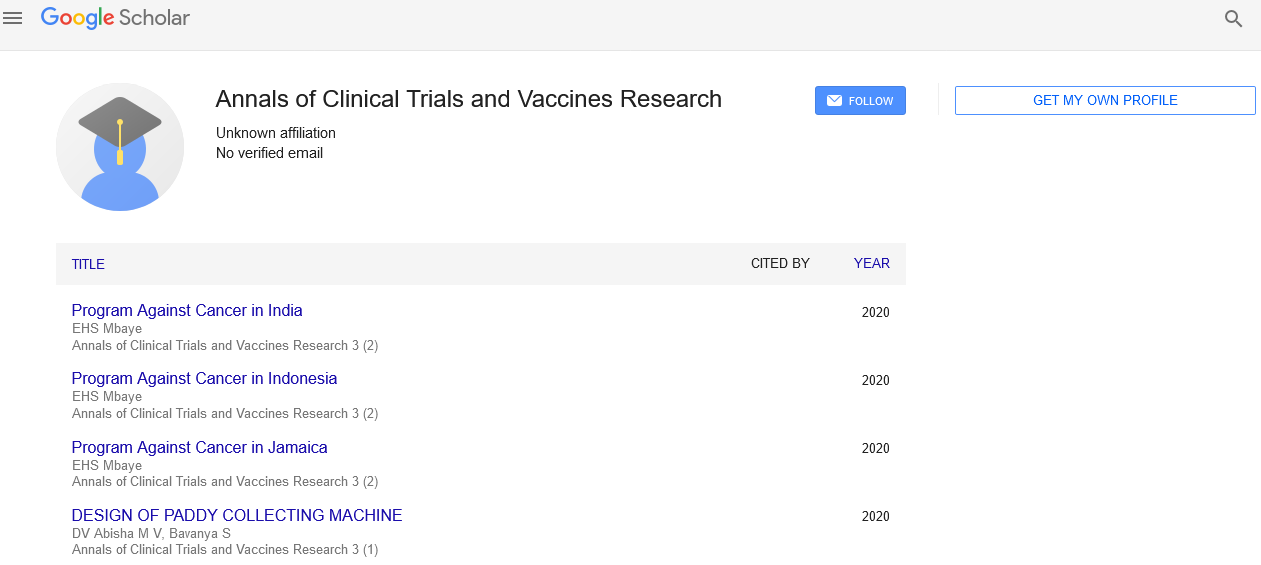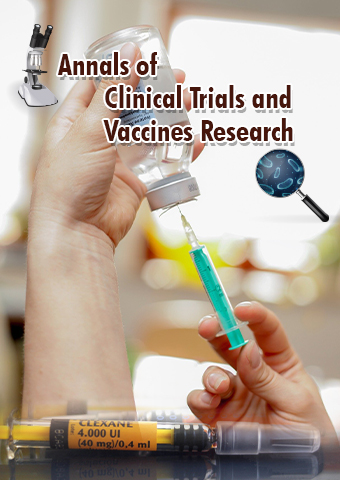Short Article - Annals of Clinical Trials and Vaccines Research (2020) Volume 3, Issue 3
Ethical algorithm for evaluation the process of Infectious diseases eradication
Olga Kubar, Maina A Bichurina and Natalia I Romanenkova
St Petersburg Pasteur Institute, Russia
Abstract
Eradication of infectious diseases is that a great example of multidisciplinarian activity at a global level, where the complex of epidemiology, virology, sociology, and ethics plays the principal role in achieving the expected result. The formation of an algorithm of ethical principles necessary to ensure the success in the global policy of infectious diseases eradication has been the main reason of analysis the specific role of ethics within the process of elimination of infections by vaccination within the various stages of the worldwide process: planning, organizing, conducting, monitoring and tracking the method of eradication. In the first stage connected with choosing the infection to be eliminated, the priority tasks include the supply of objective knowledge about the anthropoid nature of the disease and the guarantee of the absence of mutation of the virus, the availability of an effective and safe vaccine, and an adequate surveillance system for the infection. Socio-political prerequisites for the elimination of infection should be the opportunity and readiness of the international community for concerted efforts on a global scale. Among the ethical components that play an important role at the level of individual responsibility, it is necessary to note the personal decency, conscientiousness, caution, and exactingness of the persons responsible for the assessment and interpretation of scientific information. The choice of the optimal vaccine preparation and therefore the possibility of its universal use should be supported ethical principles of overcoming conflict of interests, altruism, equitable distribution of the burden, and benefits. The ethical format of the socio-political and economic aspects of the eradication program consists of following the principles of international solidarity, social responsibility, and respect for cultural, historical, and socio-religious diversity. The important role of all of the universal ethical principles has been indicated and confirmed during the regional/national activity within the frame of WHO program for eradication of poliomyelitis, measles, and rubella.
An ethical principles algorithm which is necessary to ensure the success of the eradication policy has been developed. It is based on the analysis and assessment of the significance of the ethical component in the process of the WHO program for eradication poliomyelitis. In general, the elimination and eradication of infections with the help of vaccination include various stages such as the formation of an idea, planning, organizing, conducting, monitoring, and tracking. Our purpose is to identify the ethical components inherent in each stage, both relevant to the activities of a particular stage and determining the overall elimination strategy. At the first stage - the formation of the idea and planning of the activities, the most important is the scientific credibility of eradication, which includes the objective knowledge of the anthropologic nature (inherent in poliomyelitis); the availability of an effective and safe vaccine; an adequate system of epidemiological surveillance, and the readiness of the international community for joint concerted efforts on a global scale. The fulfillment of these mandatory requirements allows us to establish significant ethical characteristics of this stage, which primarily include credibility, reliability, honesty, and the conflict of interest’s absence in scientific approaches, based on individual and social responsibility. To ensure a comprehensive review of existing scientific hypotheses, their critical evaluation and forecast the reasoning, it is necessary to follow the ethical principles of openness, pluralism, and independence of ethical expertise. The second stage - organization and formation of the polio eradication program, from the ethical point of view, is based on the principles of international solidarity, social responsibility, and respect for cultural, historical and socio-religious diversity. The choice of the optimal vaccine and the possibility of its widespread use in terms of ethics requires overcoming the conflict of interests, altruism, and fair distribution of burden and benefits. On the third stage, in addition to observing the above mentioned universal ethical principles, the international community and individual states have to take all appropriate measures for legislative, administrative, and economic support based on respect for human dignity, human rights, and fundamental freedoms. The agreements that developing countries could participate in the program based on sharing scientific knowledge, relevant know-how, and equitable distribution of all available resources (vaccines, reagents, etc.) should be reached at the level of international cooperation. The polio eradication program demonstrated a large-scale and coordinated public-private partnership in public health. It involved 200 countries, territories, and regions, 20 million volunteers, and more than 2 billion doses of vaccine were administrated. It shows that at the global level, the elimination and eradication of infections are impossible without the support of society, which must be achieved by appropriate actions in the field of education, equal access to the personnel training, and public information. Information itself should be open, objective, honest and available and have feedback As an example of an adequate information policy we can mention the formation of the active position of the population by communicating the goals and methods of the poliomyelitis eradication program in various countries of the world. During the 6-day National Day of Immunization against Poliomyelitis in India, an enormous amount of operational activities were carried out, including the opening of 640,000 vaccination points, the participation of 2.3 million vaccinators, and 137 thousand curators, who visited 191 million households and vaccinated 172 million children.
The context of measures of such social involvement and responsibility should also include the mechanisms of “double loyalty” situations and value priorities of public health provided by constitutional norms. Such measures cover the possibility of restrictive measures in relation to personal freedom - “restriction of freedom in the interests of public health”; solidarity and consistency of steps at the international level by the global control and monitoring such actions, as quarantine and tourism. At the same time, it is necessary to take into account and observe the ethical factor of proportionality, which provides for the fact that restriction of personal freedom and measures to protect the society from harm should not overstep the limits of what is truly justified by the current level of risk or critical need for the whole society.
During the “control and surveillance” stage, moral and ethical challenges of responsibility to future generations dominate, requiring scientific solidarity and objectivity in matters of guaranteeing the real eradication of the wild-born pathogens. Special attention should be paid to the elements of data storage and containment of pathogenic strains. From the ethical point of view, the qualities of individual responsibility, honesty, uncompromising specific individuals involved in this issue, and adherence to the principles of international solidarity to prevent abuse and bioterrorism again come to the fore.
The interdisciplinary analysis of the WHO poliomyelitis eradication program includes virological, epidemiological and clinical components on the one hand and ethical-legal criteria on the other hand. These criteria should be recognized as the obligatory ethical component in an integral part of all the measures to eliminate and eradicate the infections. It is indispensable to integrate the ethical component into the plans and operational documents in order to achieve the ethical integrity of decisions and actions at all the levels of the government, in terms of their social responsibility, openness, reasonability, and accountability of the society.

